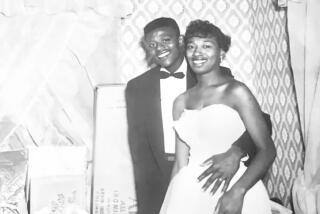Survivors Battle Over Vet’s Final Resting Place
- Share via
Both family and country have dug graves for Emory “Rex” Bartlett.
The World War II veteran’s plot at Riverside National Cemetery lies a stone’s throw away from a winding creek amid thousands of other graves at the fast-growing cemetery. At Brea, his plot is nestled in a quiet lawn among the grave sites of other family members.
Five years after Bartlett’s death, however, neither grave can be called his final resting place, as family members are engaged in a bitter legal battle over how best to memorialize the life of the U.S. Navy man disabled in combat.
Should he be buried in a national cemetery surrounded by fellow vets, forever honored for sacrifices to his country, as his widow desires? Or should he remain buried in a family plot in Brea, alongside the graves of his in-laws, as his daughters want?
The case heated up in November when an Orange County Superior Court judge temporarily blocked the attempts of Bartlett’s widow to move the remains from the Brea plot where he was buried in 1996. Both sides are preparing for a March hearing where a judge will decide whether to keep in place the “no move” order until a trial.
In an era of more second marriages and increased relocations for retirement, moving grave sites is not uncommon. But experts said disputes like this one are rare--occurring mainly when family members resulting from two marriages are separated by great distances.
“It [reflects] life in the 1990s,” said John Gill, a cemetery consultant and past executive director of the state Cemetery Board. “If divorce comes into play, and there are kids, occasionally there is a dispute.”
Annie Roberts Bartlett said she wants to move her husband for two reasons: She wants him closer to her home in Hemet, and she believes Bartlett would want to be buried alongside fellow veterans.
“I think he belongs there. He was a veteran and he was wounded in the service,” she said. “I think its an honor. All servicemen consider that an honor.”
But Bartlett’s two daughters from his first marriage claim in their lawsuit filed in November that their father wanted to be buried in their family plot at Brea’s Memory Garden Memorial Park, and even purchased three other grave sites before his death for other family members.
“They were really quite a close family, and he indicated to the daughters right up until six months before he died that the he wanted to be placed in the vault that he bought in Brea,” said Ken Hagen, a retired lawyer who is assisting attorney Thomas W. Gillen on the case.
The disinterment and transport of remains is not uncommon. Families relocating to new areas often arrange for loved ones to be moved to graveyards closer to their new homes. Mortuary services say most moves in recent years have been to Las Vegas and other fast-growing areas.
When disputes do crop up, mortuary industry experts say, they occur when the dead person had two sets of families through different marriages, as in the case of Bartlett. The Bartlett dispute flared when Annie Bartlett, Bartlett’s second wife, made arrangements in October to move the remains from the Brea plot where he is buried alongside relatives of his first wife.
Though family members can’t agree on the burial site, both sides’ emotional ties to the man they’re fighting over remain strong.
He is remembered as a gentle, broad-shouldered raconteur and outdoorsman who held an assortment of jobs before opening a jewelry shop in Hemet. As a medic stationed on Guam during the war, Bartlett was hit by bomb shrapnel and suffered an arm injury that left him disabled for the rest of his life, said Annie Bartlett.
Despite his injury, her husband was a talented painter and an avid hunter and fisherman who traveled the world and made friends wherever he went, she said. “He was loved by everybody.”
Even though Annie Bartlett authorized the Brea burial in 1996 and has often visited the grave site, she said her worsening health prevents long trips. “It’s just too far for me to travel anymore. I just can’t put my life in jeopardy,” she said.
Emory Bartlett’s daughters declined to comment. But their attorneys said the fact that he purchased the grave sites speaks for itself.
“That was his wish,” said Hagen. “He wanted to be buried with people he had a close relationship with.”
More to Read
Sign up for Essential California
The most important California stories and recommendations in your inbox every morning.
You may occasionally receive promotional content from the Los Angeles Times.














